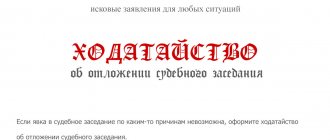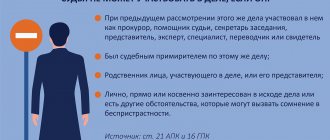The right to challenge a court or judge is an inalienable right of participants in legal proceedings. This right means that the parties to the case have the opportunity to express their confidence in the judge or express disagreement with his participation of the court judges in a collegial composition or the judge presiding alone over the trial of the case. Therefore, before the start of the trial, before explaining to the participants in the process their rights and obligations, the judge is obliged to find out from them: “Do they trust the court?” In this case, the presiding officer must explain to the parties on what grounds the judge(s) may be challenged.
Is a judicial challenge allowed?
The judicial process must be independent and impartial, and the concept of immutability of the judiciary is enshrined in procedural legislation. Therefore, the judge who heard the case from the very beginning must make an informed decision.
A challenge is a requirement to replace a judge , which occurs in exceptional situations. For example, according to Art. 18 of the APC, a judge is removed from conducting proceedings if he falls ill or dies, his powers are forcibly suspended, or he submits his resignation.
Free legal consultation
+8 800 100-61-94
Such rules apply both in civil cases and in proceedings regarding criminal or administrative crimes and offenses.
Sometimes the participants in the process themselves remain dissatisfied with the behavior of the judge and also doubt his impartiality. Therefore, they can insist on his recusal. When applied, the judge will not be able to further participate in the legal proceedings in a particular case for compelling reasons.
Features of the process include:
- the applicant can be any participant in the process;
- the correct sequence of actions is given in Art. 16 Civil Procedure Code;
- a judge will not be able to make a decision on a case if he was previously a secretary, prosecutor, witness, expert, translator or other specialist in this dispute;
- challenge is relevant if the judge is represented by a relative of a participant;
- there is evidence that the person communicates outside the trial with witnesses, victims, suspects or other persons who appear in court;
- challenge applies if the judge has previously publicly assessed the dispute or made official statements regarding this proceeding.
A specialist’s interest in the results of the proceedings can be not only obvious and personal, but also indirect. A citizen must independently remove himself from the process, but if he refuses to follow the basic principles of legal proceedings, then other persons can insist on his removal.
Note to citizens: how to challenge a judge.
Recent trends in legislative activity directly indicate the desire of the legislator to facilitate the work of the judicial system, and often, to the detriment of the rights and legitimate interests of the parties to the trial.
In this publication, summarizing my own experience, I propose a certain structure of the legal justification for an application to disqualify a judge in cases where doubts arise about his objectivity and impartiality when considering a case.
This construction is applicable both in civil proceedings and in criminal proceedings, since the grounds for disqualifying a judge in these processes are similar (Article 16 of the Code of Civil Procedure of the Russian Federation, Article 61 of the Code of Criminal Procedure of the Russian Federation). I will consider the issue of recusal using the example of civil proceedings.
The relevance of this topic is also due to the fact that in light of recent changes in civil procedural legislation, you have the only chance to challenge a judge on the same grounds (Part 4 of Article 19 of the Code of Civil Procedure of the Russian Federation). In case of refusal to satisfy the challenge, in the absence of other grounds, this right is lost. Therefore, the preparation of an application for recusal must be taken seriously.
Criminal procedural legislation does not yet contain such restrictions. Similar changes in this part come into force on August 13, 2019.
So.
In accordance with Part 1 of Art. 16 of the Code of Civil Procedure of the Russian Federation, the grounds for disqualifying a judge are circumstances when:
1) during the previous consideration of this case, participated in it as a prosecutor, court secretary, representative, witness, expert, specialist, translator;
2) is a relative or relative of one of the persons participating in the case, or their representatives;
3) is personally, directly or indirectly interested in the outcome of the case, or there are other circumstances that cast doubt on his objectivity and impartiality.
4) the composition of the court considering the case cannot include persons who are related to each other.
From October 25, 2019 Clause 1 Part 1 Art. 16 of the Code of Civil Procedure of the Russian Federation is supplemented by one more subclause 1.1: if the judge was a judicial conciliator in this case.
If the grounds for challenge specified in clauses 1, 2 and 4 are still more or less clear, then clause 3 often causes difficulties in application. It should be noted that the grounds specified in paragraph 3 are the most often used when challenging judges. These may include such circumstances as: the judge expressing his evaluative opinion on the case before the court decision, the receipt by the judge or his relatives/acquaintances of material or legal benefits in a certain outcome of the case, the judge was previously in official or other dependence on someone of the participants in the case, an obvious gross violation of the rights of the participants in the process, obstruction of the realization of their rights and legitimate interests, etc.
According to Part 1 of Art. 46 of the Constitution of the Russian Federation, everyone is guaranteed judicial protection of their rights and freedoms.
Judges are independent and subject only to the Constitution of the Russian Federation and federal law (Part 1, Article 120 of the Constitution of the Russian Federation).
In accordance with Art. 2 of the Code of Civil Procedure of the Russian Federation, the tasks of civil proceedings are the correct and timely consideration and resolution of civil cases in order to protect the violated or disputed rights, freedoms and legitimate interests of citizens , organizations, rights and interests of the Russian Federation, constituent entities of the Russian Federation, municipalities, and other persons who are subjects of civil , labor or other legal relations. Civil proceedings should help strengthen law and order, prevent crime, and foster respect for the law and the court.
According to Part 2 of Art. 7 of the Code of Civil Procedure of the Russian Federation, if this Code grants a judge the right to single-handedly consider civil cases and perform certain procedural actions, the judge acts on behalf of the court.
Clause 2 of Article 11 of the Code of Judicial Ethics establishes that a judge must fulfill his duties conscientiously, at a high professional level, and take all measures for a timely and qualified consideration of the case.
A judge must exercise judicial powers based solely on an assessment of the factual and legal circumstances of the case, in accordance with his inner conviction, respecting the procedural rights of all persons involved in the case, regardless of any outside influence, pressure, threats or other direct or indirect interference in the process consideration of the case, no matter from which side it turns out and no matter what motives and goals it is caused by (Article 8 of the Code of Judicial Ethics).
From the interrelated provisions of Part 1 of Art. 46 and part 1 of Art. 120 of the Constitution of the Russian Federation implies the purpose of judicial control as a way of resolving legal disputes on the basis of the independence and impartiality of the court. Consideration of a dispute by an independent and impartial court is also an integral element of the right to a fair trial within the meaning of paragraph 1 of Art. 6 of the Convention for the Protection of Human Rights and Fundamental Freedoms.
In accordance with paragraph 1 of Art. 6 of the Convention for the Protection of Human Rights and Fundamental Freedoms, everyone, in the event of a dispute as to his civil rights and obligations or of any criminal charge brought against him, has the right to a fair and public hearing within a reasonable time by an independent and impartial tribunal established by law.
The Russian Federation, as a party to the Convention for the Protection of Human Rights and Fundamental Freedoms, recognizes the compulsory jurisdiction of the European Court of Human Rights on issues of interpretation and application of the Convention and its protocols in the event of an alleged violation by the Russian Federation of the provisions of these treaty acts, when the alleged violation took place after their entry into force in relation to the Russian Federation (Article 1 of the Federal Law of March 30, 1998 No. 54-FZ “On the ratification of the Convention for the Protection of Human Rights and Fundamental Freedoms and the Protocols thereto”), therefore, the application by the courts of the said convention should be carried out taking into account the practice of the European Court of Human Rights in order to avoid any violation of the Convention for the Protection of Human Rights and Fundamental Freedoms (clause 10 of the resolution of the Plenum of the Supreme Court of the Russian Federation dated October 10, 2003 No. 5 “On the application by courts of general jurisdiction of generally recognized principles and norms of international law and international treaties of the Russian Federation").
In a number of decisions of the European Court of Human Rights, including the decisions of February 26, 1993, Padovani v. Italy (paragraphs 25 and 27), of February 28, 1993, Fey v. Austria ( paragraphs 28 and 30) and of 10 June 1996 “Pullar v. the United Kingdom” (paragraph 30), based on the interpretation of Article 6 of the Convention for the Protection of Human Rights and Fundamental Freedoms, the general criteria for an impartial court are formulated:
- firstly, the court must be “subjectively impartial” , i.e. none of its members may openly display partiality or personal prejudice; personal impartiality is assumed until proven otherwise. This criterion reflects the personal beliefs of the judge in a particular case;
- secondly, the court must be “objectively impartial” , i.e. sufficient guarantees are necessary to exclude any doubts in this regard. This criterion, in accordance with which the question is decided whether certain verifiable facts, regardless of the behavior of the judge, allow one to doubt his impartiality, takes into account external signs: when making an appropriate decision, the opinion of interested parties is taken into account, but does not play a decisive role - decisive is whether their concerns can be considered objectively justified. Any judge about whose impartiality there are legitimate grounds for doubt must withdraw from the court hearing the case.
As the Constitutional Court of the Russian Federation has repeatedly emphasized, the Russian Federation as a rule of law state is obliged to provide an effective system for guaranteeing the protection of human and civil rights and freedoms through justice that meets the requirements of fairness (resolutions of the Constitutional Court of the Russian Federation dated March 16, 1998 No. 9-P, dated February 10, 2006 city No. 1-P, etc.).
The Constitution of the Russian Federation guarantees everyone judicial protection of their rights on the basis of competition and equality of the parties (Part 3 of Article 123 of the Constitution of the Russian Federation).
Compliance with these principles of administration of justice is ensured by the entire range of civil procedural means and procedures.
So, part 1 of Art. 12 of the Code of Civil Procedure of the Russian Federation establishes that justice in civil cases is carried out on the basis of adversarial law and equality of the parties.
It is the court, by virtue of Part 2 of Art. 12 of the Code of Civil Procedure of the Russian Federation, while maintaining independence, objectivity and impartiality, manages the process and creates conditions for establishing factual circumstances when considering and resolving civil cases, which is necessary to achieve the objectives of civil proceedings. This power of the court, being a consequence of the principle of judicial management of the process, acts as a procedural guarantee of the right of citizens to judicial protection enshrined in Article 46 (Part 1) of the Constitution of the Russian Federation (determination of the Constitutional Court of the Russian Federation dated April 26, 2016 No. 859-O).
The impartiality of the court when considering a specific case is ensured by the civil procedural institution of recusal of a judge.
As stated above, the circumstances in which the participation of a judge in the consideration of a case within his jurisdiction is unacceptable due to the impossibility of observing the principle of impartiality of the court are provided for in Article 16 of the Code of Civil Procedure of the Russian Federation.
Thus, a judge cannot consider a case and is subject to recusal if he is personally, directly or indirectly interested in the outcome of the case or there are other circumstances that cast doubt on his objectivity and impartiality (Clause 3, Part 1, Article 16 of the Code of Civil Procedure of the Russian Federation).
In the case of a challenge, the court hears the opinions of the persons participating in the case, as well as the person to whom the challenge is filed, if the challenger wishes to give explanations. The issue of challenge is resolved by a court ruling (Article 20 of the Code of Civil Procedure of the Russian Federation).
Accordingly, the impartiality of judges hearing a civil case is presumed until proven otherwise. A guarantee of compliance with the principle of impartiality of a judge considering a case alone when resolving the issue of a challenge filed against him is the issuance of a reasoned ruling confirming the absence of circumstances that would allow one to doubt his impartiality when considering this case.
In addition, procedures for reviewing court decisions by higher courts are a guarantee. At the same time, the question of the objectivity and impartiality of the court must be resolved in each specific case, taking into account the factual circumstances, the establishment of which is within the competence of courts of general jurisdiction. (rulings of the Constitutional Court of the Russian Federation dated February 8, 2007 N 325-О-О, dated March 20, 2008 N 155-О-О, dated July 15, 2008 N 465-О-О, dated May 28, 2009 . N 617-О-О, etc.).
If circumstances are established that cast doubt on the impartiality of the judges (judges) of a lower instance, and the judicial acts issued by them are annulled by a court of a higher instance, the case must be sent for a new trial by a different composition of judges.
From the above norms of the Constitution of the Russian Federation in their relationship with the provisions of the Convention for the Protection of Human Rights and Fundamental Freedoms, which has priority over domestic laws, from the interpretation of these provisions of the Convention in the relevant decisions of the European Court of Human Rights, as well as from the procedural norms of Articles 12, 16, 21 of the Code of Civil Procedure of the Russian Federation it follows that the right to judicial protection is a fundamental constitutional and procedural right-guarantee. One of the inalienable properties of the right to judicial protection and a necessary condition for a fair trial is the right to an impartial trial, ensured by the possibility of challenging judges provided for by law. In a democratic society, litigants must have confidence in the court, which can only be called into question on the basis of credible and reasonable evidence to the contrary.
When allowing an application for recusal, the court must determine whether the applicant's doubts that a particular judge was not sufficiently impartial were objectively justified.
At the same time, Chapter 2 of the Code of Civil Procedure of the Russian Federation, which contains the grounds for disqualifying a judge, is common to all stages of civil proceedings; therefore, any judge who falls under these grounds is subject to challenge at any stage of the process.
Otherwise, the implementation of the provisions of the Code of Civil Procedure of the Russian Federation on challenge will be incomplete, which will entail a violation of the applicant’s rights to a fair trial, a mandatory component of which is the impartiality of the court.
In addition, doubts about the objectivity and impartiality of a judge can be associated with abuses on his part, which can be expressed in infringement of the rights and legitimate interests of a party, which, among other things, may indicate the presence of a corruption component in the actions of the judge.
In accordance with the definition in the federal law of December 25, 2008. No. 273-FZ “On Combating Corruption”: corruption is not only the giving or receiving of a bribe, but also abuse of official position , abuse of power , commercial bribery or other illegal use by an individual of his official position contrary to the legitimate interests of society and the state in order to obtain benefits in the form of money, valuables, other property or services of a property nature, other property rights for oneself or for third parties, or the illegal provision of such benefits to the specified person by other individuals.
This law repeatedly points out the need for interaction between the state and citizens in combating corruption. Thus, Article 7 establishes the main directions of activity of government bodies to increase the effectiveness of combating corruption, namely:
- creating a mechanism for interaction between law enforcement and other government bodies with public and parliamentary commissions on anti-corruption issues, as well as with citizens and civil society institutions;
- adoption of legislative, administrative and other measures aimed at attracting state and municipal employees, as well as citizens, to take a more active role in combating corruption, and at creating a negative attitude towards corrupt behavior in society;
- strengthening control over the resolution of issues contained in appeals from citizens and legal entities.
One of the main principles of combating corruption in the Russian Federation in accordance with paragraph 7 of Article 3 of this law is cooperation between the state and individuals.
At the same time, by combating corruption, the law understands the activities of federal government bodies, government bodies of constituent entities of the Russian Federation, local government bodies, civil society institutions, organizations and individuals within the limits of their powers (Article 1 of the Anti-Corruption Law):
a) to prevent corruption, including identifying and subsequently eliminating the causes of corruption (prevention of corruption);
b) to identify, prevent, suppress, disclose and investigate corruption offenses (fight against corruption);
c) to minimize and (or) eliminate the consequences of corruption offenses.
Thus, the grounds for disqualifying a judge may be closely related to the corruption component, which, in turn, should entail bringing the perpetrators to criminal liability.
In the vast majority of applications for challenge, the courts do not satisfy, do not bother to indicate the reasons for the refusal and carefully consider the applicant’s arguments, but this should not bother you, since if there is sufficient data on the legality of the requested challenge, a violation of the right to a fair trial is grounds for filing a complaint to the European Court of Human Rights (ECHR), since, contrary to the opinion of the Constitutional Court of the Russian Federation, the Russian Federation is not a legal state.
image source delo-sochi.ru
Who is eligible to apply
Each participant in the trial has the right to challenge the judge. To do this , a statement is formed in which the person describes the main reasons why he does not trust the specialist, and therefore insists on his removal. Before the start of the proceedings, participants are not only informed of their rights and responsibilities, but are also notified of the possibility of changing the judge if there are good reasons not to trust him.
Attention! Typically, the party who insists on recusal entrusts the process of filing the application to his lawyer.
When can you submit an application?
Based on Art. 19 of the Code of Civil Procedure, a petition for recusal is submitted before the direct consideration of the conflict situation. Therefore, it is advisable to draw up this statement during the preliminary hearing.
But sometimes doubts about the impartiality of the judge arise already during the consideration of the dispute. Therefore, you can submit an application at any time . But for this there must be evidence of compelling reasons. If a person does not have confirmation of his words, then he will be refused.
How to properly file an application to disqualify a judge? Procedure for 2022
In accordance with the norms of current legislation, an application to disqualify a judge is submitted directly at the court hearing. After this, the court is obliged to hear the person requesting the challenge. The next stage is hearing other persons involved in the case (if they wish to speak).
Further, the issue of challenge is resolved by a court ruling made in the deliberation room (Article 20 of the Code of Civil Procedure of the Russian Federation). Violation of this order entails the cancellation of the court decision.
Note! If a judge considers a civil case alone, the issue of recusal is resolved by the same judge.
Reasons
A judge is removed from a case only if there are good reasons. This is usually due to the fact that the citizen is interested in the results of the case, as well as if there are doubts about his impartiality.
The reasons can be objective or conditional. Objective ones include :
- the judge had previously considered this case, so the law prohibits repeated participation, but this does not include revised cases;
- the specialist has already participated in the study of this case, but in a different status, for example, worked as an investigator, prosecutor or lawyer;
- the presence of family ties with any participant in the process or the prosecutor acting as prosecutor is revealed, therefore self-recusal is necessary, otherwise the court decision may be canceled.
It is quite simple to confirm objective grounds, so the applicant must have official evidence. Difficulties arise only in the presence of conditional grounds, which are difficult to prove because they are based on a subjective assessment. These include the judge’s interest in the results of the case, and it can be not only direct, but also indirect. If it is established that it is indeed beneficial for a person to resolve the dispute, then a challenge is carried out.
To confirm personal interest, it is established whether the judge communicates with any participant in the process outside of court hearings. These persons may be relatives, acquaintances or friends. Often the accused or prosecutor is the organization in which a relative of the judge works. Sometimes the specialist even agrees with any participant to receive a monetary reward for the desired solution.
Reference! If the application is denied because evidence has not been presented, the participant cannot resubmit the application.
Grounds for disqualifying a judge in 2022
As mentioned above, the challenge of a judge must be: firstly, motivated, and secondly, justified. In accordance with the provisions of Art. 16 of the Code of Civil Procedure of the Russian Federation, an application for challenge can be filed by participants in civil proceedings only in the following cases:
If the judge has already participated in a previous civil case
- as a prosecutor, witness, legal representative, specialist or expert.
If the judge is the spouse or relative (parent, adoptive parent, brother or sister, grandson, nephew, etc.) of the person participating in the case.
If the judge is directly or indirectly interested in the outcome of the case. For example, the applicant has information that the judge has friendly (or, on the contrary, hostile) relations with the persons participating in the case.
Under what circumstances is the procedure impossible?
There are some reasons why it is impossible to recuse a specialist from a trial, although prosecutors and victims often refer to these circumstances:
- Previously, the case was considered in court, but after appealing the court decision, it was sent for re-examination by the cassation court. According to Art. 287 of the Arbitration Procedure Code, the cassation court has the right to send the case for re-examination to the same judge. Sometimes a decision is made to consider it by another judicial panel, for which an appropriate instruction is given.
- An extra-procedural application has been submitted to the arbitration court regarding the case, which is under investigation. The presence of this petition cannot be a reason for recusal. But sometimes information from such an appeal can raise doubts about the impartiality of the judge.
Under such circumstances, litigants often face negative decisions on their applications.
On the recusal of officials
Persons who may be excluded from criminal proceedings are divided into two groups:
- Officials. We are talking about a judge, an investigator, an investigator, a prosecutor.
- Other participants. These are representatives and defenders of the parties, experts, translators.
The official must announce the termination of his participation in the matter independently. Otherwise, one of the participants in the process may apply for compulsory recusal. The grounds for excluding an official from the process depend on the specific circumstances. For example, a judge must recuse himself if he has previously decided on a given case in a lower court.
There are no such restrictions for prosecutors and investigators. In order to remove them from participation in a criminal case, it is necessary to prove either the fact of personal interest or the inability to fully perform official duties.
A request for recusal must be made in writing. The procedure for making a final decision on this issue depends on the status of the official:
- The judge draws up a resolution to recuse himself. Also, the decision to eliminate him can be made by a specially convened panel of judges. The judge's recusal is possible before the start of the hearing or until the jury is formed. If a judge is removed, another official takes his place as the case must continue.
- Prosecutor. The decision on dismissal is made by a higher-ranking prosecutor (at the investigation stage) or a court (during trial).
- Investigator or investigator. The application must be submitted to the head of the inquiry department or the head of the investigative agency. If we are talking about the challenge of a person holding a leadership position, then the petition is submitted to the prosecutor.
The secretary is responsible for ensuring an orderly hearing. He can also be excluded from participation in the meeting due to personal interest. The application is submitted to the judge hearing the specific criminal case.
Rules for drawing up a document
If a citizen has evidence for a legal challenge, then a written petition is formed, although oral appeals are allowed. It is advisable to compose a text that reflects the identified grounds.
Although there is no unified form, the following data must be included:
- personal data of the applicant, provided by his full name and residential address;
- details and name of the case;
- grounds for challenge, which must be motivated;
- links to evidence and legal requirements;
- request to remove the judge from the proceedings;
- date of preparation and signature of the applicant.
Important! Documents confirming the reasons are attached to the application. There is no requirement to pay any fee, and there are no negative consequences for the citizen if the application is rejected.
Procedure for consideration of the issue
The withdrawal process is divided into successive stages:
- the participant in the process draws up a petition and prepares evidence of his case;
- documents are transferred to the judicial authority before the consideration of the case;
- the received documentation is evaluated;
- a vote of judges is held or a single decision is made on this application;
- a determination is drawn up containing a negative or positive decision;
- it is prohibited to appeal the refusal separately;
- if the applicant considers the act controversial, then he can draw up another statement with additional arguments in his favor;
- If a judicial challenge is carried out, then the case is still considered by the court of the previous instance.
If a magistrate is dismissed by representatives of the district court, then a specialist working in the same area is selected in his place. If this is not possible, then the case is transferred to another district.
Arbitrage practice
In practice, many appeals submitted by participants in the trial are not satisfied. Usually the reason is a lack of evidence or the use of a subjective assessment.
An example is the following situation:
- a citizen complained about the actions of employees of the regional administration, filing a claim in a court of general jurisdiction in the city of Petropavlovsk-Kachastsky;
- the judge postponed the hearing for one month at the request of a representative of the local administration;
- before the start of the trial, the plaintiff’s lawyer filed an appeal to challenge the judge;
- the statement indicated that the plaintiff had doubts about the impartiality of the specialist, but there was no evidence;
- a negative decision was made on this petition, since there was no documentary evidence to support the plaintiff’s words.
Attention! Although the challenge is carried out before the consideration of the case materials, if during the proceedings the participants have new information about the judge, then they have the right to submit an application at any time. It is formed in writing, and the received evidence is also attached to it.
Commentary on Article 16 of the Code of Civil Procedure of the Russian Federation
1. Part 1 of the commented article is similar in meaning to Part 1 of Art. 18 Code of Civil Procedure of the RSFSR.
Part 1 of Art. 120 of the Constitution of the Russian Federation establishes that judges are independent and are subject only to the Constitution of the Russian Federation and federal law. The implementation of this requirement presupposes the existence of a legislative mechanism that removes a judge from the process in cases where there are real circumstances that could affect his independence, objectivity and impartiality. Such a mechanism in civil proceedings is the institution of recusal of a judge (magistrate).
The grounds for withdrawal are:
1) participation of the judge in the previous consideration of the case as a prosecutor, court secretary, representative, witness, expert, specialist, translator. This basis excludes the possibility of a judge considering a case if previously in the same case he had a different procedural and legal status. This is quite reasonable, since the judge’s previous participation in the trial in a different capacity may affect his objectivity and impartiality.
However, the legislator did not cover all possible cases of previous participation of a judge. For example, a judge could previously have been a plaintiff in the case under consideration, and after concluding an assignment agreement, withdraw from the disputed legal relationship. Is it acceptable for the procedural legal predecessor of one of the parties to subsequently become a judge in this case? Of course not.
In comparison with the Civil Procedure Code of the RSFSR, the commented norm now includes an indication of a new subject of civil proceedings - a specialist;
2) family or inherent relations of the judge with any of the persons participating in the case or their representatives. In Part 2 of Art. 281 of the Code of Civil Procedure includes parents, children, brothers and sisters as close relatives. Family law reveals the concept of close relatives somewhat more broadly, including relatives in a direct ascending and descending line (parents, children, grandparents and grandchildren), full and half-blooded (having a common father or mother) brothers and sisters (paragraph 3 of Art. 14 SK).
We believe that the circle of persons who are covered by the concept of “relative” in paragraph 2 of part 1 of the commented article should include not only close relatives, but also all other relatives (including adopted children and adoptive parents) similar to the provisions set out in relation to inheritance by law ( see Chapter 63 of the Civil Code).
Judicial practice also proceeds from the inadmissibility of a restrictive interpretation of the concept of “relative”. In particular, the Plenum of the Supreme Court of the USSR, although its explanations are not formally subject to application <1>, indicated that family relations should be understood as the presence of not only close kinship, but also kinship of more distant degrees (cousins, sisters, etc.). The Presidium of the Supreme Court of the Russian Federation, interpreting a similar rule on the grounds for disqualifying a judge in criminal proceedings (Clause 2, Part 1, Article 59 of the Code of Criminal Procedure of the RSFSR), explained that relatives are understood not only as close relatives, but also as persons with more distant kinship relations < 2>.
——————————— <1> See sub. “c” clause 2 of the Resolution of the Plenum of the Supreme Court of the Russian Federation of January 20, 2003 No. 2 “On some issues that arose in connection with the adoption and entry into force of the Civil Procedure Code of the Russian Federation.” <2> See paragraph 6 of section. “Judicial practice in criminal cases” of the Review of legislation and judicial practice of the Supreme Court of the Russian Federation for the fourth quarter of 2002, approved by the Resolution of the Presidium of the Supreme Court of the Russian Federation of March 12, 2003.
A novelty is the reference in the commented norm to the relatives of the judge (relatives of the spouse of the judge himself). Such an innovation is completely justified, especially since previously both in judicial practice and in scientific and practical literature <1> the norm of paragraph 2 of part 1 of Art. 18 of the Code of Civil Procedure of the RSFSR was proposed to be interpreted broadly, extending it also to relatives;
——————————— <1> See, for example: Civil procedural legislation: Commentary / Ed. M.K. Yukova. M., 1991. P. 29.
3) personal, direct or indirect interest of the judge in the outcome of the case or other circumstances that cast doubt on his objectivity and impartiality.
The direct interest of a judge presupposes that he has a property or other legally protected interest in a certain resolution of a substantive legal dispute.
An indirect interest of a judge will occur in cases where the legal consequences of a judicial act issued in a case may affect the property or other legally protected interests of other persons in whose welfare the judge is interested.
Other circumstances that raise doubts about the objectivity and impartiality of the judge should include, in particular: a) the judge’s previous official dependence on any of the persons participating in the case or their representatives; b) the fact that the judge has another dependence (this refers to cases when the competence of one of the persons participating in the case or their representatives is to resolve issues in which either the judge himself or his relatives or in-laws are interested); c) the fact that the judge has legal obligations to any of the persons participating in the case or their representatives; d) the fact that any of the persons participating in the case or their representatives have legal obligations to the judge; e) friendly or hostile relations of the judge with any of the persons participating in the case or their representatives; f) the fact of the presence of statements by the judge about how the case will be resolved on the merits or a specific procedural issue (a similar basis is contained in clause 7, part 1, article 21 of the Arbitration Procedure Code; see also clause 6 of the Review of the judicial work of garrison military courts for 2000 <1>).
——————————— <1> Approved by the Military Collegium of the Supreme Court of the Russian Federation on January 3, 2001.
The list of grounds specified in the commented norm is exhaustive. At the same time, a judge is also subject to recusal if a judicial act was previously issued ordering the case to be considered by a different composition of judges (see Article 241, paragraph 3 of Article 361 of the Code of Civil Procedure), as well as if the rules on the inadmissibility of repeated participation of a judge in the consideration of the case (Article 17 of the Code of Civil Procedure).
2. The court hearing a case cannot include persons who are related to each other.
The question of the existence of kinship should be resolved similarly to the provisions formulated in relation to paragraph 2 of part 1 of the commented article.
We believe that this restriction should also apply to cases of consideration of the case in a higher instance (the court of a higher instance should not include a judge who is a relative of the judge who previously considered the case). However, this interpretation contradicts the literal meaning of Part 2 of the commented article, according to which the restriction applies only to the simultaneous presence in the judicial composition of persons who are related to each other.









